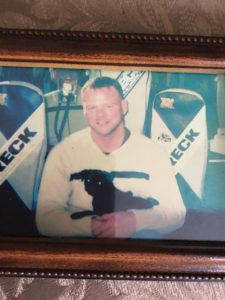Dads called to action

Matthew LaGreca. Courtesy of Tony LaGreca.
In the aftermath of losing a child, several dads I know now value time differently and orient their lives to helping others overcome crushing obstacles.
This is not heroic. It can be grueling with setbacks and triggers. Sometimes we rush into the very forces that took a loved one away. Which carries a cost.
Yet for some fathers, like other men, and women, becoming activists is a response to grief that makes profound sense.
It may be purely pragmatic: the handy guy able to help others literally fix things, which may extend to self-care and addressing, if not also repairing, emotional damage. Others gain a new sense of urgency, including wanting to be more present and not distracted by relatively miniscule stuff. We also appreciate the ravages and flow of time differently—especially as a son or daughter’s very being seems forever frozen in place.
Others become activists as their priorities shift. Driven by the need to make some meaning from his death, and struggling to form a new identity, we do new things at work, through advocacy, or education. We want to help others proactively.
This becomes a way to honor his or her life. Whether doing things purely locally in our community, among friends and colleagues, or on a larger scale.
And we won’t sit still.
My friend Tony LaGreca does this. He has taken on a nationwide quest to end the scourge of opioid prescriptions.
Tony adds his voice and relentless energy to the cause
His son Matthew died five years ago, a victim of the continuing epidemic. Matthew overdosed on methadone. He was addicted for many years after a football injury in college, for which his father says he was given a high-dosage prescription of Oxycodone. Matthew’s girlfriend also became addicted and died of a similar overdose.
LaGreca dug into the causes of the epidemic and became a full-throttled advocate for change and accountability. He also supports families struggling to help relatives in recovery, and co-facilitates a support group for other grieving parents. In addition to running a business, Tony finds himself crisscrossing the country for demonstrations, public hearings, and attending court cases to address those responsible for the crisis—and sometimes, offering potential solutions.
The rapid-fire speaking Bostonian is a member of Fed Up!, a national coalition to end the epidemic as well as Team Sharing, a nonprofit representing many families. At times he rages; in other moments he listens and counsels.
With passion born from his loss, Tony adds his voice and relentless energy to the cause.
“I believe the pharmaceutical industry is responsible for this epidemic,” he told a panel of the Food and Drug Administration during a public hearing this week. The panel is considering the clinical utility of high-dose opioids for treating constant severe intractable pain. “You want to stop the epidemic, stop the unnecessary prescribing.”
During the past four years, he’s put himself out there—which not every grieving dad needs to do, or can summon himself for.
“Being an advocate, I don’t let his death be in vain,” LaGreca says. “The thing to help in grief the most is action.”
Tony has laid down on sidewalks at demonstrations and speaks at rallies. He ticks off a list of Sackler family members (owners of Purdue Pharma), chafing at their now-tainted philanthropy. Relishing the protests at museums and institutions that bear their name, he chuckles. He follows the evidence being uncovered in court cases against Purdue and other drug manufacturers in multiple states.
LaGreca remains a father first. During the FDA hearing, he choked up mentioning two grandchildren who are going without. Defiance mixed with pain in his voice. “I came hear at my own expense to stop the madness,” he explained.
Becoming an activist is a response to grief that makes profound sense
That coupling of rage and taking positive action feels so authentic to me. It can lead to a blending and even reconciliation of both. This compels other men that I know as well.
Some of them continue to seek healing four or five years after child losses. Naturally, they go about it in very different ways. For several, activism on a much smaller scale than what Tony does is a common denominator. They often support other guys and couples trying to cope with their own trauma or loss.
At some point, for many of us, taking healthy steps forward involves transitioning with a new identity. Seeking a new purpose, recognizing a changed worldview, or just reconstructing something from all the debris are part of this.
Each one calls us to act.
“To have hope under extreme circumstances is an act of defiance that permits a person to live life on his or her own terms.” — Jerome Groopman, The Anatomy of Hope
